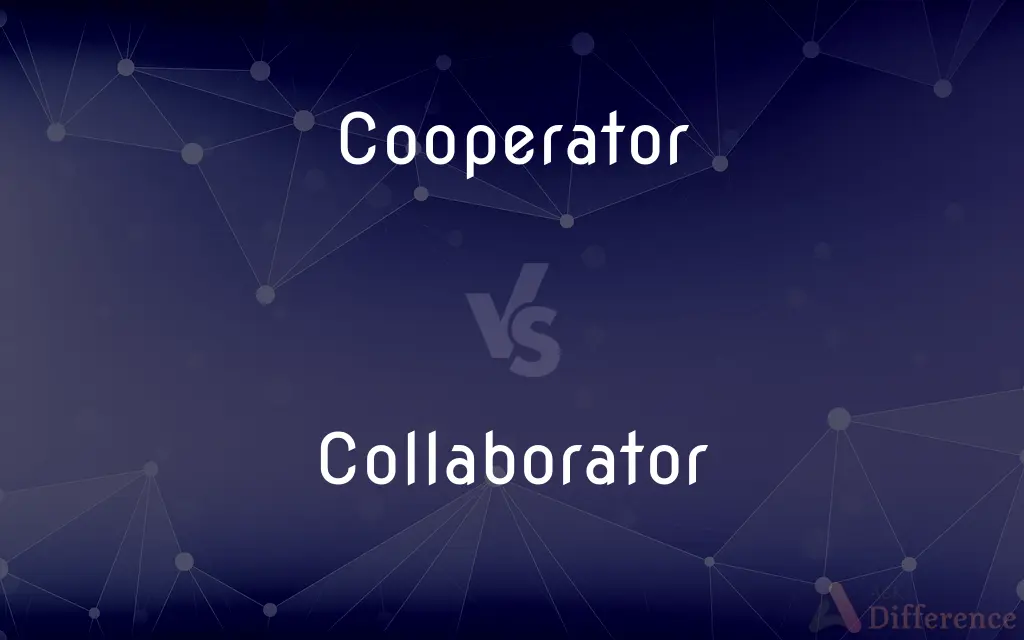Cooperator vs. Collaborator — What's the Difference?
By Tayyaba Rehman — Published on January 13, 2024
Cooperator refers to someone who cooperates, often passively or on a small scale, while a collaborator actively works with others, usually in creative or intellectual endeavors.

Difference Between Cooperator and Collaborator
Table of Contents
ADVERTISEMENT
Key Differences
Conceptual Focus: A cooperator is someone who participates in a process or activity, usually by providing assistance or support. Their role is often more passive, involving compliance or following guidelines set by others. On the other hand, a collaborator is typically more actively engaged, working jointly with others in an intellectual or creative endeavor. Collaborators are often seen as equal partners in the process of creation or problem-solving.
Level of Engagement: Cooperators often play a supporting role, contributing to a part of a project or assisting in a larger endeavor. Their involvement may not require high levels of creativity or decision-making. In contrast, collaborators are deeply involved, bringing their unique ideas and perspectives to the table. They engage in brainstorming, planning, and executing plans, often in a setting that values each member's input equally.
Nature of Relationships: In a cooperative setting, relationships might be hierarchical, with cooperators following the lead of a central figure or organization. The interaction is often structured with defined roles and expectations. In collaborative scenarios, the relationships tend to be more horizontal, with each collaborator having equal standing and influence in the decision-making process. This often leads to a more dynamic and fluid exchange of ideas.
Outcome Orientation: Cooperators contribute to achieving a goal, often in a more segmented or compartmentalized manner. Their focus is on fulfilling specific tasks or roles. Collaborators, however, are jointly invested in the outcome of the entire project. They share responsibility for the success or failure of the endeavor, often resulting in a more integrated and cohesive result.
Application Context: The term cooperator is often used in contexts where compliance and adherence to guidelines are important, such as in scientific research or in organizational settings. Collaborator, however, is more commonly associated with creative and intellectual fields, such as in arts, academia, or in innovative business projects, where the collective pooling of skills and knowledge is crucial.
ADVERTISEMENT
Comparison Chart
Engagement Level
Generally passive, assisting in parts of a project.
Actively involved in joint efforts and decision-making.
Relationship Dynamics
Often hierarchical, following a leader or guidelines.
Typically egalitarian, with equal partnership and input.
Creativity Requirement
Less emphasis on creativity, more on following directions.
High emphasis on creativity and joint ideation.
Outcome Responsibility
Focused on specific tasks, less on overall outcome.
Jointly responsible for the entire project's success.
Typical Contexts
More common in structured, guideline-oriented settings.
Prevalent in creative, intellectual, and innovative fields.
Nature of Contribution
Supportive, often limited to specific roles.
Comprehensive, involving idea generation and execution.
Compare with Definitions
Cooperator
A cooperator is someone who assists in an endeavor without leading it.
Jane was a valuable cooperator in the research project, diligently processing data.
Collaborator
A collaborator is involved in creative or intellectual endeavors, contributing original ideas.
The software was developed with each collaborator contributing innovative code.
Cooperator
A cooperator participates in a group effort, often following established guidelines.
The committee functioned smoothly thanks to the cooperators who organized the event.
Collaborator
A collaborator participates in brainstorming and executing plans in a team.
As a collaborator, Lisa played a key role in shaping the marketing strategy.
Cooperator
A cooperator engages in cooperative actions, aiding in tasks assigned by others.
In the fundraiser, each cooperator was responsible for a specific part of the event.
Collaborator
A collaborator actively works with others on a joint project or idea.
As a collaborator in the art project, David contributed his unique painting skills.
Cooperator
A cooperator works with others to achieve a common goal, often in a support role.
As a cooperator, Mike contributed to the team by compiling necessary reports.
Collaborator
A collaborator engages in partnership, sharing ideas and responsibilities equally.
In writing the book, each collaborator added their expertise to the chapters.
Cooperator
A cooperator is someone who joins in an activity, typically in a non-leading capacity.
As a cooperator, Sarah helped in distributing resources during the campaign.
Collaborator
A collaborator is a joint partner in an endeavor, equally invested in the outcome.
In the musical, each collaborator added their voice to create a harmonious performance.
Cooperator
To work or act together toward a common end or purpose.
Collaborator
To work together, especially in a joint intellectual effort.
Cooperator
To acquiesce willingly; be compliant
Asked the child to cooperate and go to bed.
Collaborator
To cooperate treasonably, as with an enemy occupation force in one's country.
Cooperator
To form an association for common, usually economic, benefit
When buyers cooperate, they can make large wholesale purchases at a discount.
Collaborator
A person who works with others towards a common goal.
Team player
Cooperator
One who cooperates; an associate.
Collaborator
A person who cooperates traitorously with an enemy.
Cooperator
One who labors jointly with others to promote the same end.
Collaborator
An associate in labor, especially in literary or scientific labor.
Cooperator
An associate who works with others toward a common goal;
Partners in crime
Collaborator
One who willingly cooperates with an enemy, especially an enemy nation occupying one's own country.
Collaborator
Someone who assists in a plot
Collaborator
Someone who collaborates with an enemy occupying force
Collaborator
An associate who works with others toward a common goal;
Partners in crime
Common Curiosities
What defines a cooperator?
A cooperator is someone who assists in a project, typically in a supporting role.
What is a collaborator?
A collaborator is an individual who works jointly with others on a project, sharing ideas and responsibilities.
Can a cooperator have a leadership role?
Usually, cooperators assist rather than lead, focusing on support tasks.
Do collaborators have equal say in a project?
Yes, collaborators often share equal input and responsibility in a project.
How does collaboration differ in hierarchy?
Collaboration typically involves less hierarchy, with more equal partnership.
How crucial is creativity for a collaborator?
Creativity is very important for collaborators, especially in brainstorming and problem-solving.
Is creativity important for a cooperator?
Cooperators may not need high levels of creativity, as they often follow set guidelines.
Are cooperators responsible for the outcome of a project?
Cooperators contribute to specific tasks, with less focus on the overall outcome.
Are cooperators less important than collaborators?
No, cooperators are equally important but have different roles and functions.
What types of projects typically involve cooperators?
Projects that require adherence to guidelines or support tasks often involve cooperators.
Do collaborators share responsibility for success or failure?
Yes, collaborators share joint responsibility for the success or failure of their projects.
In what contexts are collaborators commonly found?
Collaborators are common in creative, intellectual, and innovative fields.
Is hierarchy important in cooperative relationships?
Hierarchy can play a role in cooperative relationships, with defined leader-follower dynamics.
Can someone be both a cooperator and a collaborator?
Yes, depending on the context and their role in different projects.
Can collaboration lead to more innovative outcomes?
Yes, collaboration often leads to more innovative outcomes due to shared creativity and ideas.
Share Your Discovery

Previous Comparison
VLAN vs. LAN
Next Comparison
Inkjet Printers vs. Officejet PrintersAuthor Spotlight
Written by
Tayyaba RehmanTayyaba Rehman is a distinguished writer, currently serving as a primary contributor to askdifference.com. As a researcher in semantics and etymology, Tayyaba's passion for the complexity of languages and their distinctions has found a perfect home on the platform. Tayyaba delves into the intricacies of language, distinguishing between commonly confused words and phrases, thereby providing clarity for readers worldwide.












































